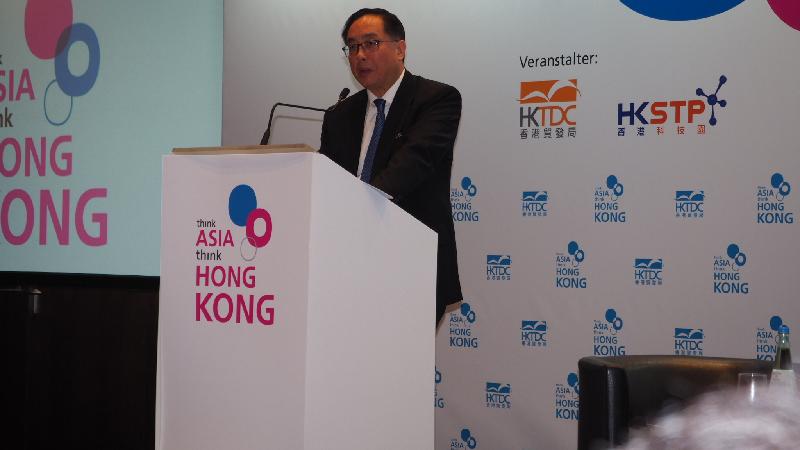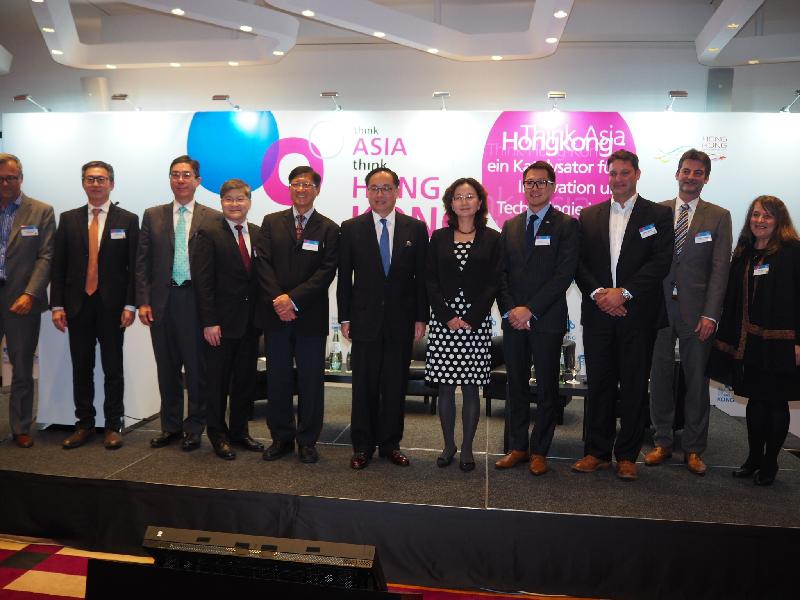Opening remarks by S for IT at "Think Asia, Think Hong Kong" - Technology Seminar in Munich (English only) (with photos)
******************************************************************************************
Raymond (Deputy Executive Director of the HKTDC, Mr Raymond Yip), CG Mao (Chinese Consul General in Munich, Ms Mao Jingqiu), distinguished guests, friends of Hong Kong, ladies and gentlemen,
Grüss Gott (good day). It's a great pleasure to be here with you today in Munich, in this golden month of September.
Taking in the streets of your storied city - not to mention the tents, beer halls and stein-toting revellers of Oktoberfest - it's easy to see why Munich placed fourth, out of more than 200 global cities, in this year's "Mercer Quality of Living" rankings.
And while I'm at it, allow me to congratulate the Hong Kong Trade Development Council for organising its signature overseas promotion - "Think Asia, Think Hong Kong" - in Germany, and here in Munich, during Oktoberfest. That's timing I'll toast to - a little later in the day.
For now, we're here to talk business with you. Germany, after all, is Hong Kong's most important trade partner in the European Union. Last year, our bilateral trade reached 14.3 billion euros.
Germany is also Europe's largest economy, blessed with a favourable geographical location, one that extends both east and west.
Hong Kong is equally favoured when it comes to location. We are at the gateway to the Mainland of China and at the heart of Asia. Half the world's population is within five hours’ flight time from Hong Kong.
But more than location, Hong Kong is built for global business. Earlier this month, Canada's Fraser Institute named Hong Kong the world's freest economy, as it has every year since the Institute's first "Economic Freedom" report came out in 1996. Earlier this year, the Washington-based Heritage Foundation did the same - and for the 22nd year in a row.
So, count on free flow of capital and information. And that's only the beginning. Hong Kong's legal system is based on common law and boasts an independent judiciary.
In addition, our public systems are clean and efficient. We have zero tolerance for corruption. And our crime rates are as reassuringly low as you would hope, making Hong Kong the perfect place to focus on business.
And there's more good news for business. We ensure a level playing field for all enterprises, wherever they come from, whatever they do. Well, as long as it's legal. And then there's our simple and low tax system, with profits tax capped at an attractive 16.5 per cent.
Inviting advantages, to be sure. But Hong Kong is more than a global business and financial hub. Thanks to the "one country, two systems" arrangement with China, we offer unparalleled access to the vast Mainland market.
The Mainland and Hong Kong Closer Economic Partnership Arrangement, or CEPA, our unique free trade agreement with the Mainland, eliminates import tariffs, providing preferential access to Mainland markets in most service sectors, from financial services and legal, to tourism, information technology, trade, logistics and more. Let me add that German companies based in Hong Kong, or partnering with Hong Kong companies, enjoy the full benefits of CEPA.
That's business in Hong Kong: full of advantages, replete with opportunities. And, as head of Hong Kong's Innovation and Technology Bureau, I can tell you that certainly includes innovation and technology. This is firmly on our policy agenda.
Indeed, world-class technology infrastructure for enterprises, research institutions and universities has long flourished in Hong Kong. For industry, academia and the research sector, we offer financial support for those looking to commercialise their R&D results, to nurture talent and strengthen their collaboration with the Mainland and other economies.
And since the Innovation and Technology Bureau's establishment last November, we have intensified and accelerated our efforts. Indeed, the Hong Kong Government is investing more than 2 billion euros to promote innovation and technology development.
These initiatives include the expansion of Hong Kong Science Park, home to some 600 multinationals, small and medium enterprises and start-ups, including about a dozen from Germany.
We will also launch a 230-million-euro Innovation and Technology Venture Fund, while investing a similar amount in a Midstream Research Fund for our universities, together with nearly 60 million euros toward an Innovation and Technology Fund for Better Living.
Beyond our targeted I&T strategy, Hong Kong is very much aware of the growing relations between the Mainland and Germany.
During Chancellor Merkel's recent visit to China, the two sides reached consensus on accelerating co-operation between Germany's Industry 4.0 industrial information technology programme and the "Made in China 2025" blueprint for upgrading the Chinese industrial sector.
The "Made in China 2025" strategy emphasises high technology in spearheading the development of a smart and environmentally friendly manufacturing industry.
Co-operation in this will mean significant business opportunities for German innovation and hi-tech industries. And, given our unique advantages, Hong Kong would be the ideal base for localising and testing German technology before it enters the Mainland market.
To fully grasp the opportunities of the "Made in China 2025" strategy, consider that one of the mandates of the Hong Kong Government is to drive the re-industrialisation of Hong Kong. We'll do so by focusing on three areas: robotics, healthy ageing and smart city.
We will also promote smart production and research at our industrial estates, injecting some 950 million euros into two pilot projects - an Advanced Manufacturing Centre and a Data Technology Hub.
Incorporating robotics and information technology, advanced manufacturing industries will supercharge the entire value chain covering R&D, design, production, testing and marketing and branding. This will also help diversify our economy, which at present is more than 90 per cent service-based.
Our long-term goal is to revolutionise Hong Kong's manufacturing industry and revitalise the "Made in Hong Kong" brands to propel economic growth.
Beyond technology's focus, there's the Belt and Road Initiative - a pivotal China strategy certain to bring collaboration between Germany and Hong Kong to new heights.
The strikingly ambitious Belt-Road Initiative has attracted more than 60 countries spanning Asia, Africa, the Middle East and Europe. Infrastructural connectivity is the Belt-Road’s engine. Through that, enhanced ties are expected in such wide-ranging areas as trade and policy development, culture and people-to-people bonds.
The Central Government has expressed clear support for Hong Kong's participation in the Belt and Road Initiative.
As we do now, Hong Kong will serve as the Belt-Road's "super-connector", the central financial and professional services bridge between the Mainland and other Belt-Road nations. Beyond traditional industries, we will also play that role in such emerging sectors as innovation and technology.
In short, I encourage more German businesses, entrepreneurs and investors to turn to Hong Kong in exploring the unprecedented opportunities arising from the Belt and Road Initiative.
My thanks to the Hong Kong Trade and Development Council and the Hong Kong Science and Technology Parks Corporation for organising today's Seminar.
For Hong Kong and Germany, there is much to look forward to - today and tomorrow.
Last but not least, I am happy to be back at Munich again amidst the wonderful weather during Oktoberfest. Prost and thank you.
Ends/Thursday, September 29, 2016
Issued at HKT 21:48
Issued at HKT 21:48
NNNN




